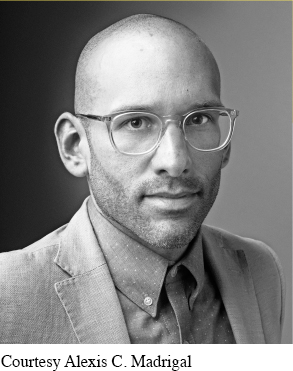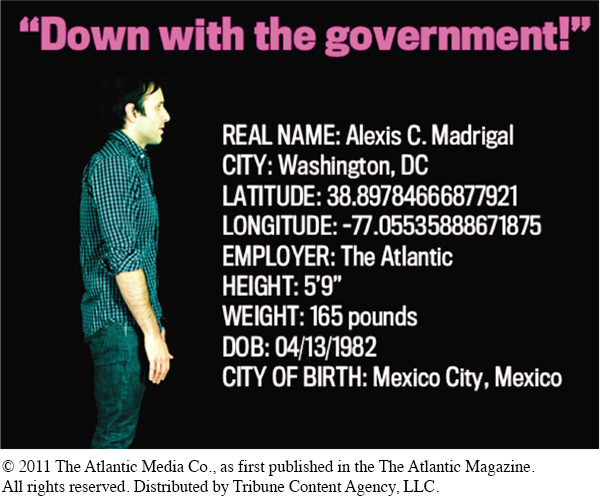9.23
Why Facebook and Google’s Concept of “Real Names” Is Revolutionary
Alexis C. Madrigal

Alexis C. Madrigal (b. 1982) is a deputy editor at TheAtlantic.com, where he focuses mostly on technology issues and the effects of technology on the future. He is also the author of Powering the Dream: The History and Promise of Green Technology.
KEY CONTEXT Madrigal wrote this piece in 2011, just after Google released a new policy that insisted on authenticating users’ real names and prohibited the use of pseudonyms. “By providing your common name, you will be assisting all people you know in finding and creating a connection with the right person online,” a Google spokesman said at the time.


This picture accompanied the original article in the Atlantic magazine.
Should you have to use your real name online? It’s an issue that’s long simmered among social media critics and supporters alike. On one end of the spectrum, there’s 4chan, where everything is anonymous. On the other, there are Facebook and Google Plus. Both have drawn fire for categorically preventing people from using pseudonyms. This week, a new site, My Name Is Me, launched to make the case to allow anyone to use any name they choose.
This has seemed like a niche battle to me: a tiny group of activists complaining about some edge cases while the real-
But this week’s discussions have made me rethink my intuition about names on social networks. My instincts had strongly pointed to requiring real names; my experience in the comment trenches of different websites has led me to believe that pure anonymity online creates a short-
I’ve changed my mind. The kind of naming policy that Facebook and Google Plus have is actually a radical departure from the way identity and speech interact in the real world. They attach identity more strongly to every act of online speech than almost any real world situation does.
5 I want to walk you through how I’ve come to this understanding. Because I’ve been obsessively listening to Philosophy Bites podcasts, I’m going to use a thought experiment.
Imagine you’re walking down the street and you say out loud, “Down with the government!” For all non-


In this photo from Greece, protestors are hiding their identities because they fear reprisal from the government.
In your head, adjust the settings for this thought experiment (you say it at work or your hometown or on television) or what you say (something racist, something intensely valuable, something criminal) or who you are (child, celebrity, politician) or who is listening (reporters, no one, coworkers, family). What I think you’ll find is that we have different expectations for the publicness and persistence of a statement depending on a variety of factors. There is a continuum of publicness and persistence and anonymity. But in real life, we expect very few statements to be public, persistent, and attached to your real identity. Basically, only people talking on television or to the media can expect such treatment. And even then, the vast majority of their statements don’t become part of the searchable Internet.
Online, Google and Facebook require an inversion of this assumed norm. Every statement you make on Google Plus or Facebook is persistent and strongly attached to your real identity through your name. Both services allow you to change settings to make your statements more or less public, which solves some problems. However, participating in public life on the services requires attaching your name to your statements. On the boulevards and town squares of Facebook, you can’t just say, “Down with the government,” with the knowledge that only a small percentage of the people who hear you could connect your statement to you. But the information is still being recorded, presumably in perpetuity. That means that if a government or human resources researcher or plain old enemy wants to get a hold of it, it is possible.
The pseudonym advocates note that being allowed to pick and choose a different name solves some of these problems. One can choose to tightly couple one’s real-
10 I can understand why Google and Facebook don’t want this to happen. It’s bad for their marketing teams. It generates social problems when people don’t act responsibly under the cloak of their assumed identity. It messes up the clarity and coherence of their data. And maybe those costs do outweigh the benefits pseudonymity brings to social networks.
But then let’s have that conversation. Let’s not pretend that what Google and Facebook are doing has long-
Understanding and Interpreting
What is “pure anonymity” (par. 3), according to Alexis C. Madrigal?
What is the main argument against online anonymity that the author lays out in the third paragraph?
Madrigal states, “[I]n real life, we expect very few statements to be public, persistent, and attached to your real identity” (par. 7). Think of examples from your own or others’ experiences that both support and contradict this statement.
What does the author mean when he says that Google and Facebook don’t want anonymity because “[i]t’s bad for their marketing teams [. . .] [and] messes up the clarity and coherence of their data” (par. 10)?
The last paragraph of the piece begins with “But then let’s have that conversation.” What exactly is the conversation that Madrigal suggests we need to have?
Analyzing Language, Style, and Structure
How does Madrigal establish his ethos on this topic throughout this article?
Explain how the “thought experiment” Madrigal proposes in the sixth paragraph assists in making his point about the dangers of using real names online.
How does Madrigal use pathos, specifically fear, to support his argument?
Explain the effectiveness of Madrigal’s repeated use of the terms “public,” “persistent,” and “attached.”
How does the first photograph and accompanying text communicate the author’s attitude toward the issue of anonymity online?
Connecting, Arguing, and Extending
In what ways do you choose to be anonymous online or not? Do you do as the author suggests here and “have multiple identities for separate networks” (par. 9)? Why or why not?
Visit the website of a local newspaper and scroll through the reader comments at the bottom of a few articles on controversial topics. How many are anonymous and how many seem to be attached to real-
life identities? What do you notice about the nature of the comments? Do they create a “short- circuiting of our social software,” as Madrigal suggests in paragraph 3? Write a letter to officials at Google, Facebook, Twitter, or another social media service and argue for either the right to be anonymous on their site or the requirement for all users to be identified by their real names.
Online bullying, or cyber-
bullying, has been identified as a significant social problem. To what extent would this issue be resolved if everyone was required to identify himself or herself online? Explain, using evidence from your own or your friends’ experiences.